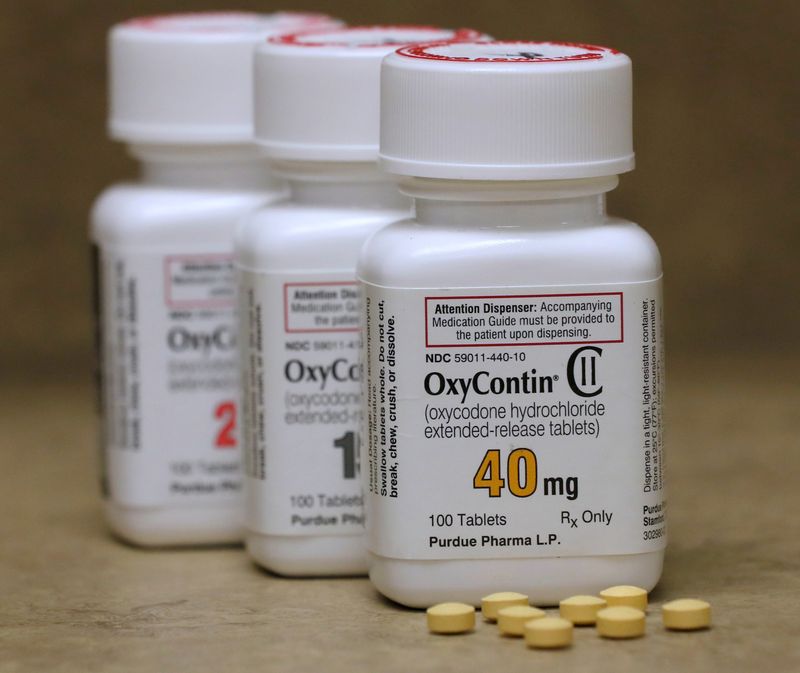By Mike Spector
NEW YORK (Reuters) - A group of 25 state attorneys general oppose a settlement of U.S. opioid probes being negotiated with Purdue Pharma LP and members of the wealthy Sackler family who own it, arguing the deal would improperly entangle state and local officials with future sales of the company's addictive pain drug OxyContin.
In a letter to U.S. Attorney General William Barr, the state attorneys general take issue with the Justice Department's condition that Purdue transform into a "public benefit company" that would be run on behalf of thousands of U.S. communities suing the drugmaker and Sackler family members. The letter cited a previous Reuters report detailing discussions to resolve the investigations.
One controversial aspect of that proposal is that the entity would steer proceeds from continued sales of OxyContin to those litigants, which include myriad state and local governments.
The attorneys general say the proposal "compromises the proper roles of the private sector and government" as officials attempt to hold alleged perpetrators of the nation's opioid crisis accountable, according to a copy of the correspondence reviewed by Reuters. They contend Purdue should instead be sold to a private buyer, adding that one unidentified suitor for the company has emerged.
Representatives for Purdue, Sackler family members tied to the company and the Justice Department declined to comment.
The opposition, including by the attorneys general from Massachusetts, New York and California, could complicate negotiations to resolve both the Justice Department probes and thousands of lawsuits alleging Purdue and Sackler family members aggressively marketed prescription painkillers while downplaying their abuse and overdose risks, according to people familiar with the process.
Sustained opposition to the proposed settlement could also result in legal fees that drain Purdue's bankruptcy estate while adding uncertainty to the drugmaker's attempted reorganization.
The outcome of the settlement talks will help determine how much money U.S. communities receive to address a public health crisis that has claimed the lives of hundreds of thousands of people in the United States since 1999. The company and family deny they contributed to the opioid crisis and said their prescription drugs included proper warnings.
The letter, which was later publicly released, was signed mostly by Democratic state attorneys general. In the case of New Hampshire, it includes the signature of the deputy to that state's Republican attorney general. (To see letter, click on https://www.mass.gov/doc/october-14-2020-letter-to-attorney-general-barr/download)
BILLIONS IN OPIOID PROFIT
Purdue, which filed for bankruptcy last year facing an onslaught of litigation, and its owners are attempting to settle widespread opioid litigation under terms that require it to also resolve Justice Department probes.
While many states have opposed a settlement proposal from Purdue and the Sacklers, the states remain in court-supervised mediation in an attempt to resolve the litigation on terms the parties find acceptable.
Over the years, Purdue reaped billions of dollars in profit from its opioids, enriching Sackler family members, and funneled illegal kickbacks to doctors and pharmacies, federal prosecutors and state attorneys general have alleged. The company and family have denied the allegations.
Stamford, Connecticut-based Purdue has proposed transforming into a public benefit company that it estimates will deliver more than $10 billion to plaintiffs, partly through millions of doses of lifesaving opioid addiction and overdose reversal medications the company is developing.
The Sacklers would contribute $3 billion, cede ownership of Purdue, and potentially pay more through the later sale of another pharmaceutical business they own. Some state attorneys general have demanded the Sacklers contribute more.
Purdue is nearing an agreement to plead guilty to criminal charges as part of a broader deal to resolve the Justice Department probes, Reuters previously reported.
The settlement under discussion includes a $2 billion criminal forfeiture that the Justice Department is prepared to largely waive if Purdue steers that money to communities harmed by opioids and receives bankruptcy-court approval to become a public benefit company as it envisioned.
That proposed restructuring aims in part to allow U.S. communities to supervise sales of OxyContin that patients still use to manage pain as opposed to transferring the business to another private for-profit company.
In their letter to Barr, states said the Justice Department should not express a view on the proposal.
"If DOJ insists the Sacklers get their way and their OxyContin business is elevated into a public trust, Americans will question whether billionaires bought special treatment in this case, while working families across the country suffered," they wrote.

Members of the Sackler family linked to Purdue are expected to face a civil financial penalty while avoiding criminal charges in the proposed settlement, Reuters previously reported. The Justice Department settlement talks are fluid and some of the terms could change as discussions continue, according to people familiar with the matter.